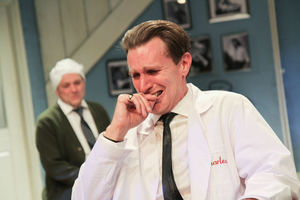Review: STAIRCASE, Southwark Playhouse
Charles Dyer two-hander not seen in London for more than half a century

![]() Not seen in London for over half a century, Staircase has been lovingly revived by Two's Company, which aims to uncover forgotten plays that reveal their own time yet shed light on how we live today. With such a rich fabric of LGBTQ+ theatre on offer, particularly in fringe venues, one might question how staging a play dating back to the 1960s and before the decriminalisation of homosexuality could be justified. While this period in history will be of interest to many, there is probably a reason why the play is so seldom seen.
Not seen in London for over half a century, Staircase has been lovingly revived by Two's Company, which aims to uncover forgotten plays that reveal their own time yet shed light on how we live today. With such a rich fabric of LGBTQ+ theatre on offer, particularly in fringe venues, one might question how staging a play dating back to the 1960s and before the decriminalisation of homosexuality could be justified. While this period in history will be of interest to many, there is probably a reason why the play is so seldom seen.
Charlie Dyer (named after the playwright) and Harry C. Leeds (an anagram of the playwright's name) are partners in profession and personal lives. The hairdressers have been together for two decades, except that same-sex relationships are banned by law. Charlie is due in court, having been arrested for sitting on a man's knee. Harry also has a great deal on his mind - namely the fact that he is losing his hair, which in his business is disastrous. As banter bounces between the two, other issues are raised to the surface as they confront their loneliness, alienation, and insecurities.
Dyer successfully balances weighty sentiments with teasing jest. Paul Rider as Harry and John Sackville as Charlie capitalise on the comedy, both exhibiting exemplary timing and investing their all into their performances. Director Tricia Thorns evidently has a respect for the material and its subject matter and steers away from the camp that dominated the much-vilified screen version starring Rex Harrison and Richard Burton. She draws the best from her cast and we are also gifted with an aesthetically pleasing and detailed set courtesy of Alex Marker.
Although in a love-hate relationship, the characters do come over as somewhat toxic, raising the question of why they are even together. Perhaps it would not have been so overt to the original audience; however, much has changed since the play's original incarnation and there is subsequently a slight air of discomfort as we witness the relentless back-and-forth between the two. This fuels much of the comedy, but at the same time it is hard to fully invest in them and their relationship. It emphasises the play's age and renders it archaic and at times unrelatable for a 2021 audience.
Many of the themes examined are universal. The fact that being gay was illegal until relatively recently is something that is still hard to digest and this does afford some resonance. It should also be said that thanks to the pandemic, many of us have been thrust into isolation and restricted from doing the things that define and please us. This adds a new layer to the play, but unfortunately isn't enough to sustain our captivation. Undeniably dated and arguably overlong, with a tendency to veer towards repetitiveness and drawn-out scenes, Staircase is pleasant enough, but ultimately unmemorable.
Staircase at Southwark Playhouse until 17 July
There will be a live stream of both performances on Saturday 3 July
Read our interview with director Tricia Thorns
Photo credit: Phil Gammon
Reader Reviews

Videos
